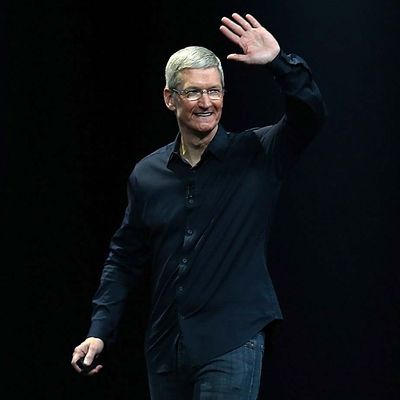
Apple introduced some fairly cool things at its yearly big-deal developer conference today: a new desktop operating system called OS X Yosemite, a new mobile operating system called iOS 8, some cross-device syncing features, and a new programming language called Swift. Nothing earth-shaking for the average consumer, but the features added in Yosemite and the changes to iOS should make your Macs, iPhone, and iPads incrementally better and more fun. (The roundup can be found over at the Verge, Wired, or at your tech blog of choice.)
But the most exciting thing Cook & Co. announced today had nothing to do with cloud storage or toolbar transparency, and it didn’t make developers ooh or ahh. It was a small, unsexy feature, buried in the middle of the two-hour keynote speech, called HealthKit.
The details of HealthKit (which was developed with the help of Nike and the Mayo Clinic) aren’t all clear yet, but we know that it will allow iOS users to collect, store, and share their health and medical information from their smartphones. Likely, the app inside HealthKit (called Health) will allow people to pull data from smart devices like Fitbits, track their eating habits and exercise patterns, and take basic medical information about themselves with them on the go. None of these features are groundbreaking and most already exist in other products. But by pulling them together into a preinstalled iOS app, Apple is trying to embed them into iPhone users’ basic rhythms, giving them a scale they’ve never had before.
To see how this could be a big deal, take the Emergency Card, one of the features that will reportedly be included in HealthKit. There’s nothing revolutionary at all about Emergency Card. According to 9t05Mac’s sources, it would just be a screen within HealthKit that prompts you to enter in your basic health information: name, birth date, blood type, medicines you take. That information wouldn’t need to be encrypted, sent anywhere, or monetized with ads. It would just be there, on your phone, in case an emergency responder ever needs to find it after an incapacitating accident.
Emergency Card is about as boring as apps come. A novice coder could probably throw it together in a few hours. It’s not even particularly novel. (ICE Standard, an app for Android and iOS that was created by the nonprofit About the Kids Foundation, offers more or less the same thing.) So why would I be excited about it?
Because if the pre-WWDC reports are correct, HealthKit would be simple, intuitive, user-centric (Apple doesn’t stand to make much, if any money, from it, at least not in any obvious way I can think of), and would improve some number of its users’ lives in huge, transformational ways. In other words, it would represent the kind of innovation that Silicon Valley promises but rarely delivers.
Apple isn’t a health-care company, and HealthKit probably won’t matter much to its overall corporate strategy. But it’s a great use of Apple’s biggest asset — ubiquity — in the service of helping its users lead better lives. There are 800 million iOS devices in the world. And in a world where our phones and computers contain every piece of information about us, there’s no reason a person’s basic medical information should remain locked up in a doctor’s file cabinet. If even a dozen deaths a year could be prevented by making accurate, phone-based medical information available to doctors and paramedics, including HealthKit in iOS 8 would be one of the most important decisions in Apple’s history. (There are a lot of things the Beats acquisition might accomplish, but life-saving probably isn’t one of them.)
Don’t get me wrong: Not all technology has to save lives to be useful. And not every tech company whose products contribute to longevity is morally unimpeachable. (Uber has undoubtedly saved lives by taking drunk drivers off the road, for example, but its corporate strategy still rubs a lot of people the wrong way.) But Apple is in the unique position of being able to effect real change with a minor tweak to its operating system. And it did it, with no apparent ulterior motive.
I hope Apple, and other tech companies, will do more of this — creating simple apps and behavioral nudges that aren’t necessarily optimized for profit or growth, but will help people in tangible ways. A health app isn’t a new idea, but nobody else can push it to the masses like Apple. And if you’re ever, God forbid, in the position of needing your medical information accessible in an emergency, you’ll be glad that Apple’s software engineers saw fit to put it on your phone. In an age when technological innovation is often judged on the amount of money it will make, rather than the good it might do, a profitless, humanitarian app might be the biggest Apple surprise of all.





























